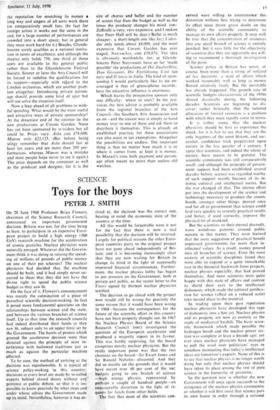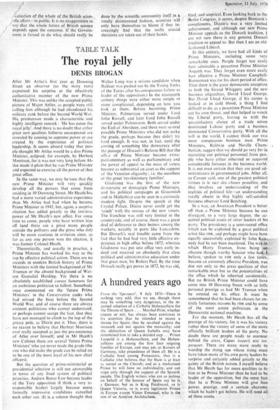SCIENCE
Toys for the boys
PETER J. SMITH
On 20 June 1968 Professor Brian Flowers, chairman of the Science Research Council, announced an important government decision. Britain was not, for the time being at least, to participate in an expensive Euro- pean project to build a high energy (300 GeV) research machine for the acceleration of atomic particles. Nuclear physicists were naturally enraged. Whatever did the Govern- ment think it was doing in vetoing the spend- ing of millions of pounds of public money on one of their pet schemes? The nuclear physicists had decided that the machine should be built, and it had simply never oc- curred to them that they did not have the divine right to spend the public science budget as they saw fit.
On the face of it, Flowers's announcement was merely the culmination of a piece of parochial scientific decision-making. in fact it posed more fundamental questions on the relationships between science and the state, and between the various branches of science itself. Up to that time the research councils had indeed distributed their funds as they saw fit, subject only to an upper limit set by the Government. The howls of protest which greeted the accelerator decision were thus directed against the principle of state in- terference with hallowed traditions just as much as against the particular machine affected.
To be sure, the method of arriving at the decision was reprehensible. It is typical of science policy-making in this country; decisions at every level are made by so-called experts behind closed doors without any pretence at public debate: so that it is im- possible to know precisely by what steps and under whose advice the Government made up its mind. Nevertheless, however it was ar- rived at, the decision was the correct one, bearing in mind the economic state of the country at the time.
All this would be forgettable were it not for the fact that there is now a real possibility that the decision will be reversed.
Largely for political reasons the other Euro- pean countries party to the original project
have not gone ahead independently of Bri- tain; and it is becoming increasingly clear that they are now waiting for Britain to change its mind in the light of supposedly improved financial circumstances. Further- more, the nuclear physics lobby has begun to put pressure on the Government, both in private and public, as the recent letter to the Times signed by thirteen nuclear physicists testified.
The decision to go ahead with the project now would still be wrong for precisely the same reason that it would have been wrong in 1968—because the consequences for the future of the scientific effort in this country have not been properly thought out. In 1967 the Nuclear Physics Board of the Science Research Council (sac) investigated the question of the European accelerator and produced a majority report in its favour. This was hardly surprising, ' for the board comprises mostly nuclear physicists. But the really important point was that the two chemists on the board—Sir Ewan Jones and Sir Ronald Nyholm—dissented. And they did so mainly on the grounds that it would have meant over 40 per cent of the SRC budgets going to one branch of science —high energy physics, represented by perhaps a couple of hundred people—an unacceptable distortion in the light of re- quests for funds from other fields.
The fact that most of the scientists con-
cerned were willing to countenance this distortion without first trying to determine its effect must throw grave doubt on the ability of the scientific community to manage its own affairs properly. It may well be true that the concentration of resources into one small branch of science is entirely justified; but it says little for the objectivity of scientists that they are apparently not will- ing to recommend a thorough investigation of the point.
Science policy in Britain has never, of course, been more than a string of isolated ad hoc decisions—a state of affairs which worked reasonably well as long as money flowed relatively freely. But the inevitable has already happened. The growth rate of scientific budgets characteristic of the 1950s slowed drastically during the following decades. Scientists are beginning to dis- cover, rather belatedly, that the rational allocation of limited resources is a problem with which they must rapidly come to terms.
It is rather ironic that the nuclear physicists should be first to experience the shock, for it is fair to say that they are the only begetters of the most blatant, and suc- cessful. confidence trick perpetrated upon society in the last quarter of a century. I agree that scientists, and indeed the whole of society, have reason to be grateful. The scientific community was still comparatively small: and although the principle of govern- ment support had been established several decades before, science was regarded worthy of such support mainly because of its in- trinsic cultural and intellectual merits. But the war changed all that. The intense effort put into the development of the science and technology necessary to produce the atomic bomb, amongst other things, proved once and for all to government that science could lead very quickly to severely practical results and hence, if used correctly, improve the physical lot of mankind.
But the scientists, to their eternal discredit, wove wondrous patterns around public naivety in this matter. They soon learned that the mere suggestion of practical benefit impressed governments far more than in- tellectual values. As a result, money poured into all branches of science. Even the most esoteric of scientific disciplines found they were able to expand at a quite remarkable rate in the financial backwash from projects, nuclear physics especially, that had proved themselves. And most scientists were quite happy with this state of affairs and content to shield their eyes to the intellectual dishonesty which made the cultural justifica- tion for science (albeit on a reduced scale) take second place to the material.
In trading upon their past reputation nuclear physicists have developed this type of dishonesty into a fine art. Nuclear physics and its progeny are now as esoteric as the study of mediaeval Swahili. The basic scien- tific framework which made possible the hydrogen bomb and the nuclear power sta- tion was complete at least a decade ago; yet ever since nuclear physicists have managed to pull the wool over politicians' eyes in somehow insinuating that today's intellectual ideas are tomorrow's exports. None of this is to say that nuclear physics is no longer worth doing but only that nuclear physics should have taken its place among the rest of pure science in the hierarchy of priorities.
So the question now is whether the new Government will once again succumb to the arrogance of the nuclear physics community or whether it will first insist that science puts its own house in order through a rational -/aluation of the whole of the British scien- ,ific effort—in public. It is no exaggeration to say that the whole future of British science depends upon the outcome. If the Govern- ment is forced to do what should really be done by the scientific community itself in a totally disinterested fashion, scientists will only have themselves 'to blame if they in- creasingly find that the really crucial decisions are taken out of their hands.































 Previous page
Previous page